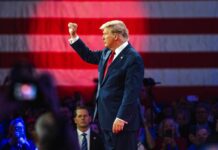
In a decisive blow to the once towering figure in the cryptocurrency world, Sam Bankman-Fried, co-founder of the now-defunct FTX exchange, was convicted Thursday evening on seven counts, including wire fraud and conspiracy charges. This verdict marks a notable chapter in the unfolding drama of what U.S. Attorney Damian Williams described as “one of the biggest financial frauds in American history.”
BREAKING: Crypto scammer Sam Bankman-Fried has been found guilty on all charges in his first criminal trial.
The New York jury determined Bankman-Fried defrauded customers, investors and lenders.
Bankman-Fried was found guilty on seven charges and faces a whopping maximum… pic.twitter.com/fXcjS4G8pC
— Collin Rugg (@CollinRugg) November 3, 2023
Bankman-Fried’s trial peeled back the curtain on the crypto industry’s fledgling days, exposing a saga of recklessness and deceit at the highest levels of FTX. With sentencing slated for March 28, the case also highlights the intersection of high-stakes finance, political influence, and the urgent need for regulatory clarity in the crypto space.
Now that the second largest donor to the Democratic Party and Joe Biden has been convicted of “one of the biggest financial frauds in US history” will they provide a refund to the victims of Sam Bankman-Fried who used stolen customer funds to pay the Dems? pic.twitter.com/65SGAWU4yF
— Kim Dotcom (@KimDotcom) November 3, 2023
On X, formerly known as Twitter, online commentator Kim Dotcom raised a poignant question about the political dimensions of this case. Bankman-Fried, who funneled significant funds into Democratic campaigns, stands accused of using illicitly obtained money to grease the wheels of political machinery. Dotcom’s post on the X platform emphasizes the need for accountability not just in the courts but also in the political arena.
The broader narrative here isn’t simply about a young entrepreneur’s fall from grace. It’s about the transparency and integrity of our financial and political systems. Bankman-Fried’s meteoric rise to a net worth of $26 billion before the collapse of FTX was supported by a network of celebrity endorsements and a bold presence in the halls of power. The question looms: Should there be a reckoning in the political sphere where Bankman-Fried’s influence was clearly felt?
With the Justice Department successfully prosecuting this case, the message to the crypto industry and its investors is unequivocal: There is no sanctuary for financial misconduct, regardless of complexity or modernity. It’s a reminder that beneath the veneer of technological innovation, the foundational principles of transparency and accountability still hold the reins.
Moreover, this trial casts a shadow on the credibility of a sector already plagued by volatility and suspicion. As the crypto world grapples with its maturity, this conviction could serve as a deterrent to the unchecked exuberance that has characterized the industry’s growth.
Jury 100% immediately voted to convict, ordered pizza, and then waited until they were finished eating to inform the judge. That’s so cold lmao https://t.co/uCZ2N0QLfZ
— Rachel (@tolstoybb) November 2, 2023
The conservative perspective here is not so much about relishing in the misfortunes of a significant Democratic donor. It’s about emphasizing the rule of law, the importance of personal responsibility, and the potential pitfalls of unbridled innovation without a corresponding commitment to ethical conduct.
In essence, Bankman-Fried’s conviction isn’t just a closure of a single legal chapter. It’s a cautionary tale that resonates across finance, technology, and politics. It’s a tale that reaffirms time-tested values amid the tumultuous waters of change and suggests a return to the principles that have long safeguarded the American economic and political system.
As the story of Sam Bankman-Fried’s rise and fall continues to unfold, it serves as a stark reminder that in the pursuit of innovation and progress, there must remain a steadfast adherence to the rule of law and ethical practice. This message resonates with conservatives and indeed should resonate across the entire political spectrum.

















